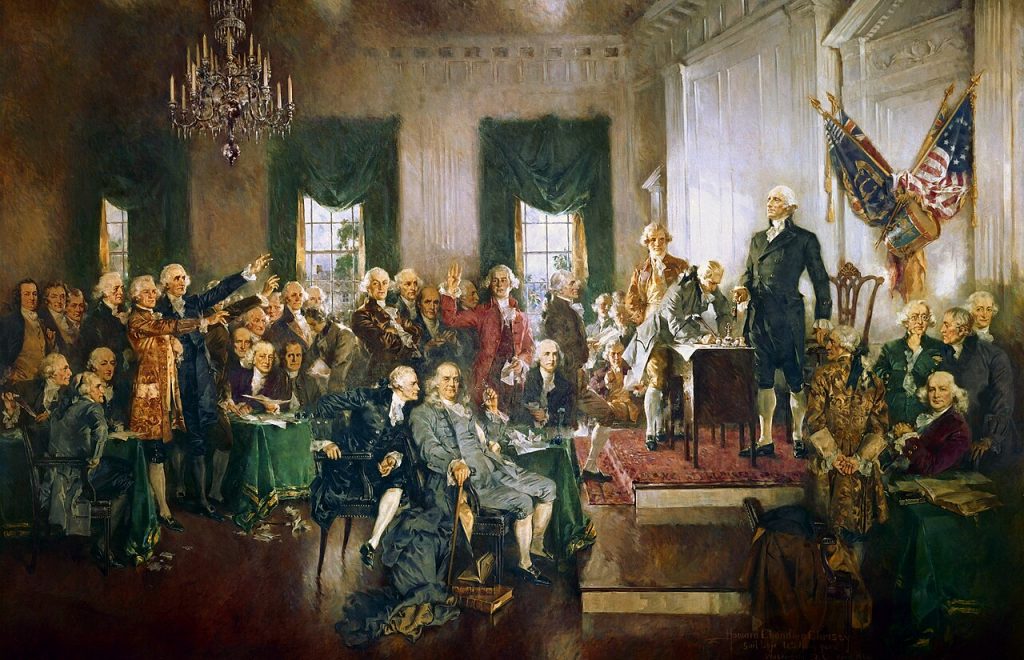
The Probability Broach, chapter 7
Win and Ed Bear, twin selves from different parallel realities, are comparing biographies. They’re trying to determine how the two of them can be so similar—”We look alike, have the same name, pursue much the same vocation. In some sense we might be the same person”—when their respective worlds are so radically different.
Win asks Ed if he knows about Chicago:
Ed grinned. “I’ll say I do. It’s the biggest city in the world!”
…He removed an object from the bookcase, fourteen inches long, maybe ten wide, half an inch thick. Sort of an overweight clipboard with a screen and keyboard. At the foot of my bed, the mountain glade disappeared, replaced by a map of North America.
I’ll give L. Neil Smith a point for this one: he pretty accurately predicted iPads and other tablet-style computers. (Then again, so did Star Trek.)
On Ed’s big-screen map, the geography of the continent is the same, but its political organization is entirely different:
All of North America, from the Isthmus to the Arctic, seemed to be one country: the North American Confederacy—no state or provincial boundaries, Chicago was indeed the biggest apple, rivaled closely by Los Angeles and Mexico City. There wasn’t any Washington, D.C., and Manhattan, in tiny, barely visible letters, seemed nothing more than a sleepy Indian village.
Ed and Win determine that they were born in the same place – although in Win’s world (“our” world), it’s the city of Denver, and at the same spot in the NAC, there’s only a tiny rural town.
Win’s parents are deceased, but Ed’s parents are living and retired to the Pacific Northwest. In both realities, both their parents are Ute Indians. Win points out that this is where the name “Utah” comes from:
“I hadn’t made the connection. But you’re right, they’re from Indian stock. Doesn’t mean very much, does it?”
“It never did to me,” I said, “but to some…” I thought about Watts and of the Arab-Vietnamese gang rumbles on my own beat. “Where I come from, people kill each other about it, sometimes.”
“Another difference between our histories?”
“Or between our people.”
This is as close as Smith ever comes to broaching the topic of racism – by implying that it doesn’t exist in the North American Confederacy. Ed Bear doesn’t think ethnic distinctions should matter, and he’s puzzled why anyone else would.
That would be commendably tolerant, except that the next thing Smith writes blows this out of the water:
“Win, why should we… I mean, why should both our worlds, if they diverged so long ago, have produced—”
“A pair of identical gumshoes? I’ve been thinking about that. Maybe because we’re both Indians.”
“I don’t understand.”
“Well, I never set much store in being ‘Native American’—neolithically ignorant while the rest of the world was out inventing the wheel, gunpowder, carbon steel. Hell, if our esteemed ancestors had been able to get along with one another thirty days running, they could have thrown Pizarro and Cortez out on their hairy asses and developed a real civilization.”
This is another running theme with libertarians, going back to at least when Ayn Rand referred to Native Americans as “savages” who deserved to be wiped out because they didn’t have capitalism. Libertarian ideology has to come up with some explanation for why it was morally permissible for white settlers to displace and massacre the original inhabitants of the New World.
Smith carries on this tradition by calling the indigenous Americans “neolithically ignorant” and saying that they lacked “real civilization”. As more recent scholarship has shown, nothing could be further from the truth. Indigenous Americans had civilizations that were at least as large and complex as the Europeans of their era – in some cases, more so.
His implication is that the Native Americans deserved to be conquered because they were too primitive and fractious to unite against European invaders. But wait a minute – I thought Smith was against government!
If the Native Americans didn’t have a unified civilization, doesn’t that mean they were an anarchy? And aren’t anarchies supposed to be naturally superior to invaders operating on behalf of a tyrannical ruler, like a king?
In fact, the conquistadors didn’t take over because of their superior weapons (though that certainly played a part), but mostly because they carried diseases the Indians had no resistance against. Those germs annihilated whole civilizations before Europeans ever set eyes on them. If not for that fluke, history might have turned out very differently.
Be that as it may, Win suggests, the fact that they both have indigenous ancestry explains why they’re the same when so much else is different:
“I don’t know exactly where our histories diverged… But those histories are mostly white people’s histories, right? I mean, George Washington got killed in the Whiskey Rebellion, that’s what Clarissa tells me… [but] whatever the White-Eyes were up to back East, that wouldn’t affect what our ancestors were doing!”
He nodded. “Not until much later, and by that time—”
“By that time our heredity—in each world—would be pretty much unaltered!”
It’s a clever hypothesis – and, to be fair, the book never presents it as anything more than Win’s speculation – but we know it can’t be right, because plenty of white people are essentially the same in both worlds. Richard Nixon makes an appearance later in the book. Also, Ayn Rand, H.L. Mencken, John Wilkes Booth, Robert A. Heinlein, and other familiar historical figures are mentioned in the appendix, which presents an abbreviated timeline of the NAC’s history.
Let’s revisit the topic of race one more time. On one occasion, when responding to what he called a “preposterous charge” of racism, Smith said this:
“The hero of my first novel, The Probability Broach, and my second, The Venus Belt, is a full-blooded Ute Indian whose wife is a freckled strawberry blonde and whose best friend is the 137-year-old Mexican widow of a Russian prince. These are the books that also introduced sapient chimpanzees, gorillas, porpoises and killer whales to science fiction…”
He writes as if having a Native American protagonist automatically disproves accusations of racism, even though said protagonist has no personal or cultural connection to his people and demeans his own ancestral civilization as primitive.
More relevant is this: as far as I know, there are no Black people in TPB. There are no Asian people. It’s said that Mexico has joined the North American Confederacy, but we never meet any Hispanic people. (Lucy, who we met briefly, is described as Mexican, but apparently only in the sense of being white with Spanish ancestry, like Francisco d’Anconia in Atlas Shrugged.)
Smith thinks that having sentient non-human characters displays his open-mindedness. Actually, it emphasizes the point about his bias. Like some other science-fiction writers, he evidently found it easier to conceive of talking chimpanzees, gorillas, dolphins, robots and aliens than human beings whose skin isn’t white. It seems he’s willing to countenance one or two token minorities, but only as long as their ethnicity means nothing and has no role in their characters or the plot.
In fact, Smith also missed an opportunity to argue for his own beliefs. He could have shown how much better everyday life was for people of color in a utopia of freedom where slavery was peacefully abolished. Instead, unnervingly, it seems as if minorities have simply disappeared.
New reviews of The Probability Broach will go up every Friday on my Patreon page. Sign up to see new posts early and other bonus stuff!
Other posts in this series:





